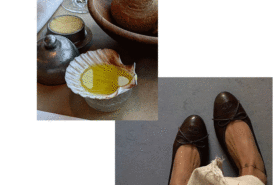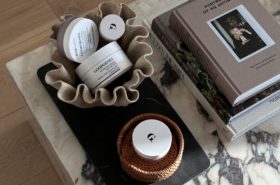
It’s not hard to see that non-dairy yogurt is trending. The number of soy, almond and coconut yogurt options at the grocery store seems to grow almost daily. Fermented food is already having a major moment due to the fact that research continues to support the importance of having a strong microbiome on overall health and longevity. Best way to improve your microbiome? You guessed it, foods high in probiotics aka fermented foods. (We also want to make sure we’re getting prebiotic foods, but that’s an article for another time.)
On top of that, diets low in animal products and high in plant-based, whole foods have been shown to decrease the risk of chronic disease. Dairy specifically, has been linked to several different types of cancer, heart disease and osteoporosis. It’s also highly inflammatory and, unless you’re getting 100% grass-fed dairy from Farmer Jon down the street who you know doesn’t use antibiotics and pesticides, it’s often laced with toxic chemicals. It’s no surprise that more people are reaching for non-dairy alternatives!
However, despite the growing number of non-dairy yogurt options at New Seasons, I’m always disappointed to see how much sugar brands add. I mean, some of these single serving containers of yogurt have more sugar than a can of soda!…Pause for dramatic effect….I have found some brands however, at grocery stores in LA, that contain highly effective probiotics and don’t add sugar to their recipe, that are quiet delicious. I personally, love me a good jar of The Coconut Cult. It’s in a decent amount of stores here in Portland, is loaded with probiotics (at one point I bought the probiotic they use in their yogurt by Elemental Wisdom to take daily as a supplement), and is absolutely delicious. I typically have a jar of it in my fridge at all times, however at 20+ bucks a pop, my coconut yogurt obsession could easily drain my bank account. (I’ve also heard that Coco Rico and New Earth Superfoods are quiet good, but haven’t tried them. They too are on the pricier.)
Instead, I try to make my own non-dairy yogurt at home using coconut meat and/or cashews. It’s actually very simple to make non-dairy yogurt at home. All you need is a dairy alternative cream or heavy milk, good probiotic, warm-ish temperature, and time. If you’re feeling extra adventurous you can follow my recipe below using fresh young coconut meat, but you can easily make this recipe using cashews or store bought coconut meat that has been frozen and thawed. I personally LOVE fresh, raw coconut water so making coconut yogurt with the meat is how I justify spending $3-$5 per a coconut – no food waste!
The recipe below is very “loose” in measurements because, honestly, you don’t need to be exact. It all depends on the consistency that you want. I suggest going thicker to start because you can always add water after it’s fermented.
One thing to consider before diving into the recipe, fermentation depends on temperature and quality of your probiotic. If you live in a cooler climate or it’s winter, it might take longer to ferment. I recommend tasting your yogurt in 8-12 hour increment to get the taste that you want. If you like a tangier yogurt, you’ll want to ferment it longer and vice versa if you prefer a sweeter yogurt.

Experience
- creamy
- tang
- delicately sweet
- cooling
Nourishment
(if using coconut meat)
- good for your gut probiotics
- good healthy fats
- low glycemic index
- high in fiber
- minerals – calcium, iron, potassium, manganese
- good for hair, skin, nails
DIY Coconut Yogurt
Ingredients
- young coconut meat (clean, with no husk attached)
- cashews (optional, if adding, start with 1/4 cup, if substituting use 1 cup)
- 1 probiotic capsule*
- water
*I generally use a 25-50 billion count probiotic. You will want to capsule form so that you can open it and tap the probiotic out of the capsule. My favorite brands are Renew Life and Garden of Life.
Directions
- In a high-speed blender, add coconut meat and/or cashews with enough water to cover. I generally use 2x the amount of meat or nuts. Blend on high until smooth. Add more water if necessary to blend smooth. Be careful not to blend to the point that the mixture is warm, you don’t want to kill your probiotics when you add them!
- Open the probiotic capsule and add contacts to the blender. Blend on medium for a hot second, just enough to mix the probiotic through.
- Pour contents into a glass or ceramic blow, cover with a clean cloth and place in a warm spot to sit for 24-48 hours.
- Once it’s fermented to your liking store yogurt in a class jar in the refrigerator.
- Try not to consume in one sitting.
If this seems daunting to you or you don’t have a high-speed blender you can try doing this is a food processor. I have not tried it so let me know how it goes! I’ve also seen a few food bloggers making coconut yogurt using canned coconut milk. Totally valid! I haven’t tried her recipe yet, but I hear that The Minimalist Baker has a great coconut yogurt recipe using coconut milk.
XO
-S



